Natural rights form a necessary basis for western civilization. But back when Thomas Jefferson borrowed ancient philosophy and religion to form the concept of “natural rights”, and it was foreign to Britain’s ears.
Natural rights answer many questions of today.
Why is abortion wrong? Natural rights (every person, no matter how small or young, has the right to life.
Why is taxation without representation wrong? Natural rights (people have a right to control the government, not the other way around).
Why is religion choice American? Natural rights (everyone has a right to choose his or her religion).
Let’s dive into natural rights and how the Founding Fathers discovered and established this concept in American law and culture.
How The Colonists Discovered Natural Rights
The French and Indian War was ended in 1763, and that was the point that Americans truly began to buck at the control of the motherland overseas. That was also the point that the British decided they wanted more control, more taxes, and fewer rights for their American colonies overseas.
The American point of view is seen clearly in the Massachusetts Constitution in 1780 which says, “All men are born free and equal and have certain, natural, essential, and unalienable rights; among which may be reckoned the right of enjoying and defending their lives and liberties; that of acquiring, possessing, and protecting property; in fine, that of seeking and obtaining their safety and happiness.”
The pressures continued to rise, and finally, the Americans made the decision to convene the Second Continental Congress.
The Second Continental Congress
Thomas Jefferson was 33 when he attended the Second Continental Congress in Philadelphia on June 20, 1775.
The Second Continental Congress would not have occurred if the king of England had reduced his pressures, taxes, and abuses of American rights. But, as history would have it, King George refused countless American petitions protesting their grievances, and even when colonists wrote to fellow British people asking for new members of Parliament to be elected, Britain no longer listened to its American colonies.
The convention hadn’t lasted long before Congress appointed Jefferson to draft the Declaration of the Causes and Necessity for Taking Up Arms, which would essentially explain to Britain why America was requesting that Britain no longer should rule them (not proclaiming independence).
However, British Parliament and King George both refused to listen to the rumblings in the American colonies, and not long after, Parliament passed an act that excluded American colonies from the kingdom’s protection, allowing Britain to seize ships, burn colonial towns, and send foreign powers to crush rebellions.
America was furious. How dare England oppress their rights?
The Continental Congress passed a resolution in May 1776 that spoke out against King George, something they had not done the year before, but they still had yet to declare independence. Congress was backed by individual colonies who had already raised their voices.
June 8, 1776 marked the day that the Continental Congress voted to write the Declaration of Independence, and once again, Thomas Jefferson was appointed as the writer.
Jefferson was slammed busy with other duties, but he completed his first draft in only a few days, writing about natural rights, attacking King George, and condemning slavery. He even condemned “these unfeeling brethren [the British people]” for not taking action in Parliamentary elections on behalf of the American people.
He submitted his draft, and the Congressional delegates made significant changes to it, including erasing “Jefferson’s passionate assault on slavery and the slave trade”, probably due to “Southern slave-holding delegates” (Cato Institute).
Finally, on July 2, 1776, the Continental Congress made the decision to officially proclaim their independence from England, and July 4, 1776 marked the day that the edited version of the Declaration of Independence was accepted as law.

Read More About the Bill of Rights and Constitutional Conventions!
The Declaration of Independence & Natural Rights
Where did Thomas Jefferson get the ideas and philosophies he used to form the Declaration of Independence?
Thomas Jefferson garnered his ideas from many sources. He had studied the great philosophers Aristotle, Cicero, Plato, John Locke, and Thomas Aquinas. The period of the Enlightenment featured great thinkers turning from religion to science and reason, and, like them, Thomas Jefferson believed that “by discovering the ‘laws of nature’ humanity could be improved.”
The Declaration of Independence stresses that certain truths are “self-evident”, including the fact that “all men are created equal” and should have the right to “life, liberty, and the pursuit of happiness.”
These don’t need to be proven – they are self-evident. Most countries, especially during the time of America’s founding, didn’t believe that all people deserved these rights – they weren’t natural to human nature. Only to the elites.
Thomas Jefferson likely learned the idea of natural rights from studying natural law, stemming from St. Thomas Aquinas’ writings during medieval times. St. Aquinas wrote that natural law revealed principles of right and wrong and, instead of knowing them through divine revelation, human reason could reveal them (MTSU).
This gave rise to heated debates between philosophers. Did all humans have a right to “natural rights”? Did slaves have natural rights?
Aristotle did not believe slaves had natural rights, yet he believed in many other natural rights, such as the right for men to rule over women (Politics).
The philosophy of natural rights affected the secular world by shifting the focus “from rules concerning individual behavior to claims of rights that individuals could make against the state” (MTSU).
Jefferson likely read Thomas Hobbes, John Locke, and Jean Jaque Rousseau who wrote widely on this subject and concluded that these rights of life, liberty, and property were “unalienable” as Jefferson wrote (MTSU).
In fact, in 1825, Thomas Jefferson wrote to Henry Lee explaining his thoughts in forming the Declaration of Independence: “All [the] authority [of the Declaration of Independence] rests … on the harmonizing sentiments of the day, whether expressed in conversation, in letters, printed essays, or in the elementary books of public right, as Aristotle, Cicero, Locke, Sidney, &c” (Constitution Leadership).

Learn More About the Founding Fathers!
Natural Rights & Religion
Aside from studying great philosophers and ideologies, Jefferson also was very familiar with religion. In fact, America was steeped in Christianity. Everyone knew the Bible, every home had a Bible, and everyone knew the tenets of Christianity.
Paul wrote in Romans that “Gentiles, who do not have the law, by nature do the things in the law, these, although not having the law, are a law to themselves, who show the work o the law written in their hearts, their conscience also bearing witness, and between themselves their thoughts accusing or else excusing them” (Romans 2:14-15, NKJV).
Early Americans would have been familiar with this and known that even people who don’t know the Bible and the ideas of Christianity still have a conscience and know right from wrong.
Constitution Leadership illustrates this idea by writing, “William Bradford wrote in his famous journal, ‘On Plymouth Plantation,’ that the Pilgrim settlers had no choice but to camp near their landing on the Massachusetts shoreline. They could not, ‘as it were, go up to the top of Pisgah to view from this wilderness a more goodly country.’ Bradford did not need to elaborate or explain his reference to an obscure mountaintop in the Middle-east where Moses first glimpsed the Promised Land, Bradford’s contemporaries would have instantly understood, seen the parallel.
Historian Forrest McDonald states that the Bible and books such as The Rights of War and Peace by Hugo Grotius, The Laws of Nature and Nations by Samuel Pufendorf, and Sir William Blackstone’s Commentaries on the Laws of England (Constitution Leadership).
Americans were well-read, highly educated, and self-taught at this time in history. They understood natural rights both from a philosophical point of view and a Christian point of view, and that is why the Founders and early leaders were able to agree on Christian principles and natural rights – because they believed in them wholeheartedly and knew them to be true.
John Adams wrote that the American Revolution was based on “the principles of Aristotle and Plato, of Livey and Cicero, and Sidney, Harrington, and Locke; the principles of nature and eternal reason; the principles on which the whole government over us now stands” (Constitutional Leadership).

RELATED: America’s Forgotten General: Henry Knox.
American State Constitutions
The state constitutions of early America reflect these beliefs perfectly.
“That all men are by nature equally free and independent, and have certain inherent rights, of which, when they enter into a state of society, they cannot, by any compact, deprive or divest their posterity, namely, the enjoyment of life and liberty, with the means of acquiring and possessing property, and pursuing and obtaining happiness and safety.” Virginia Constitution, 1776
“That all men are born equally free and independent and have certain natural, inherent and inalienable rights, amongst which are, the enjoying and defending life and liberty, acquiring, possessing and protecting property, and pursuing and obtaining happiness and safety.” Pennsylvania Constitution, 1776.
These state constitutions solidify the belief that human equality means “no one has the right to dominate anybody else without their consent” (Constitution 101).
These natural rights led to the American government maintaining two protective duties: “(1) protection against outsiders through foreign policy and armed forces, and (2) Protection against fellow citizens through the creation and enforcement of criminal law” (Constitution 101).
This was most seen in the federal government’s power over foreign matters and state governments’ power over domestic matters (Constitution 101).
Conclusion
Natural rights are important to American policy, life, and culture. If we didn’t have natural rights, we would be under the control of the government.
So after learning about natural rights, what do you think of them in today’s world? Do we, as Americans in 2021, have access to our natural rights, or is the government overstepping its bounds?
Bet I can guess what you’ll say! Let me know in the comments below.

One comment